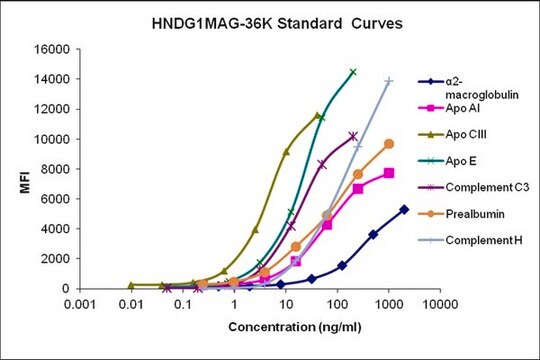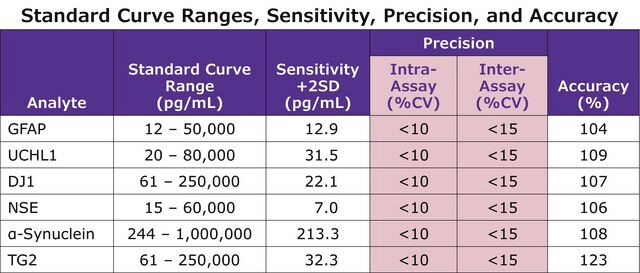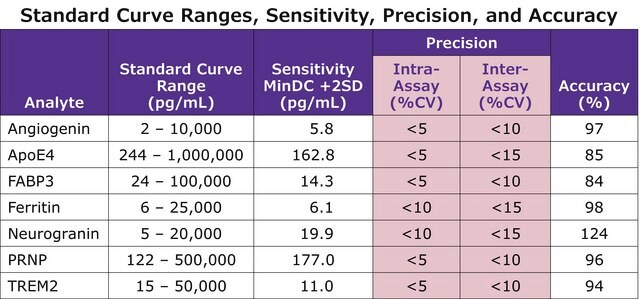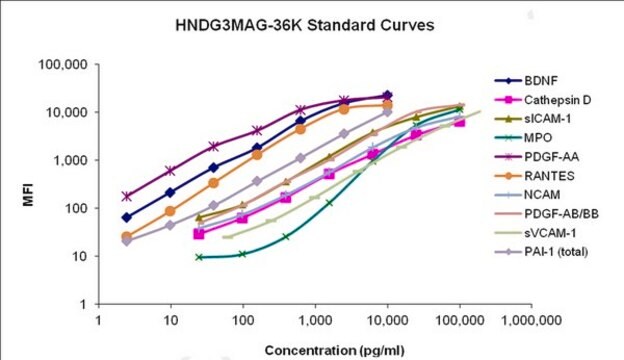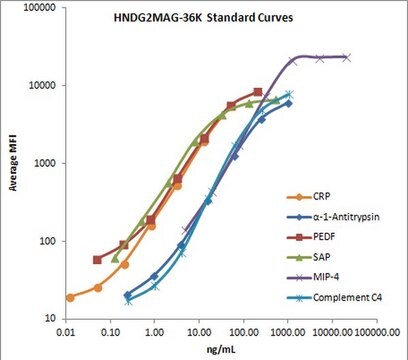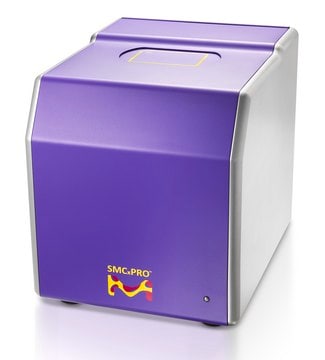HNABTMAG-68K
MILLIPLEX® Human Amyloid Beta and Tau Magnetic Bead Panel - Multiplex Assay
allows quantitative multiplex detection of multiple analytes simultaneously
Synonyme(s) :
Human Neuroscience Protein Multiplex Assay, Luminex® Human Neuroscience Panel, Millipore Human Neuroscience Immunoassay
About This Item
Produits recommandés
Niveau de qualité
Espèces réactives
human
Fabricant/nom de marque
Milliplex®
assay range
accuracy: 109%
(Spike recovery for Aβ1-42)
accuracy: 91%
(Spike recovery for pTau181)
accuracy: 98%
(Spike recovery for tTau)
sensitivity: 1.5 pg/mL
(pTau181; MinDC+2SD)
sensitivity: 10.2 pg/mL
(A?1-40; MinDC+2SD)
sensitivity: 14.2 pg/mL
(tTau; MinDC+2SD)
sensitivity: 2.5 pg/mL
(A?1-42; MinDC+2SD)
standard curve range: 0.7-500 pg/mL
(pTau181)
standard curve range: 11-8000 pg/mL
(tTau)
standard curve range: 2-2000 pg/mL
(Aβ1-42)
standard curve range: 21-15000 pg/mL
(Aβ1-40)
inter-assay cv: <15%
intra-assay cv: <10%
Technique(s)
multiplexing: suitable
Méthode de détection
fluorometric (Luminex xMAP)
Conditions d'expédition
wet ice
Description générale
The MILLIPLEX® Human Amyloid Beta Tau Bead Panel is to be used for the simultaneous quantification of Aβ40, Aβ42, tTau, and pTau181. This kit may be used only for the analysis of cerebrospinal fluid (CSF). This is a configurable assay, and some or all analytes can be selected: tau (total), amyloid β40, amyloid β42 and tau (pThr181).
MILLIPLEX® portfolio offers the broadest selection of analytes across a wide range of disease states and species. Once the analytes of interest have been identified, you can rely on the quality that we build into each kit to produce results you can trust. In addition to the assay characteristics listed in the protocol, other performance criteria evaluated during the validation process include: cross-reactivity, dilution linearity, kit stability and sample behavior (e.g. detectability and stability). Each panel and kit meets stringent manufacturing criteria to ensure batch-to-batch reproducibility.
Each MILLIPLEX® panel and kit includes:
• Quality controls (QCs) provided to qualify assay performance
• Comparison of standard (calibrator) and QC lots to a reference lot to ensure lot-to-lot consistency
• Optimized serum matrix to mimic native analyte environment
• Detection antibody cocktails designed to yield consistent analyte profiles within panel
MILLIPLEX® Human Amyloid Beta Tau Bead Panel is part of the most versatile system available for cytokine research. From our single to multiplex biomarker solutions, we partner with you to design, develop, analytically validate, and build the most comprehensive library available for protein detection and quantitation.
Panel Type: Neuroscience
Spécificité
There was no or negligible cross-reactivity between the antibodies for an analyte and any of the other analytes within a panel.
Application
- Analytes: Tau (Total), Amyloid β40, Amyloid β42, Tau (pThr181)
- Recommended Sample type: cerebrospinal fluid (CSF)
- Recommended Sample dilution: 1:2 sample dilution is recommended for extracted CSF samples
- Assay Run Time: Overnight
- Research Category: Neuroscience Metabolism
- Research Subcategory: Metabolic Disorders Obesity Inflammation & Autoimmune Mechanisms
- Research Category Neuroscience Metabolism
- NOTE: This is a competitive assay
Caractéristiques et avantages
Conditionnement
Composants
Human ABeta and Tau Quality Control 1, 1 vial, lyophilized
Human ABeta and Tau Quality Control 2, 1 vial, lyophilized
Bead Diluent, 1 bottle, 3.5mL
Set of one 96-Well Plate with 2 sealers
Assay Buffer, 1 bottle, 30 mL
Wash Buffer, 10X (0.05% Proclin), 2 bottles, 30 mL ea
Human ABeta and Tau Detection Antibodies, 1 bottle, 3.2 mL
Streptavidin-Phycoerythrin, 1 bottle, 3.2 mL
Mixing Bottle, 1 bottle
Stockage et stabilité
Informations légales
Clause de non-responsabilité
Mention d'avertissement
Danger
Mentions de danger
Conseils de prudence
Classification des risques
Acute Tox. 3 Dermal - Acute Tox. 4 Inhalation - Acute Tox. 4 Oral - Aquatic Chronic 2 - Skin Sens. 1
Code de la classe de stockage
6.1C - Combustible acute toxic Cat.3 / toxic compounds or compounds which causing chronic effects
Certificats d'analyse (COA)
Recherchez un Certificats d'analyse (COA) en saisissant le numéro de lot du produit. Les numéros de lot figurent sur l'étiquette du produit après les mots "Lot" ou "Batch".
Déjà en possession de ce produit ?
Retrouvez la documentation relative aux produits que vous avez récemment achetés dans la Bibliothèque de documents.
Protocoles
A stem cell culture protocol to generate 3D NSC models of Alzheimer’s disease using ReNcell human neural stem cell lines.
Contenu apparenté
Learn how to integrate multiplex and high sensitivity immunoassay technology to further neuroscience research with MILLIPLEX® multiplex and Single Molecule Counting (SMC®) high sensitivity immunoassay detection of Alzheimer’s disease (AD) biomarkers in human cerebrospinal fluid, plasma, and serum samples.
Neuroscience multiplex assays, such as MILLIPLEX® multiplex assays, enable simultaneous measurement of neuroscience-related biomarkers to gain a better picture of neurodegenerative diseases, neurological disorders, and neuropeptide/neurohormone signaling.
Learn how multiplex detection of Alzheimer’s disease biomarkers, using the MILLIPLEX®Human Amyloid Beta and Tau Magnetic Bead Panel, allows for a different perspective on neurodegenerative disease research.
Notre équipe de scientifiques dispose d'une expérience dans tous les secteurs de la recherche, notamment en sciences de la vie, science des matériaux, synthèse chimique, chromatographie, analyse et dans de nombreux autres domaines..
Contacter notre Service technique